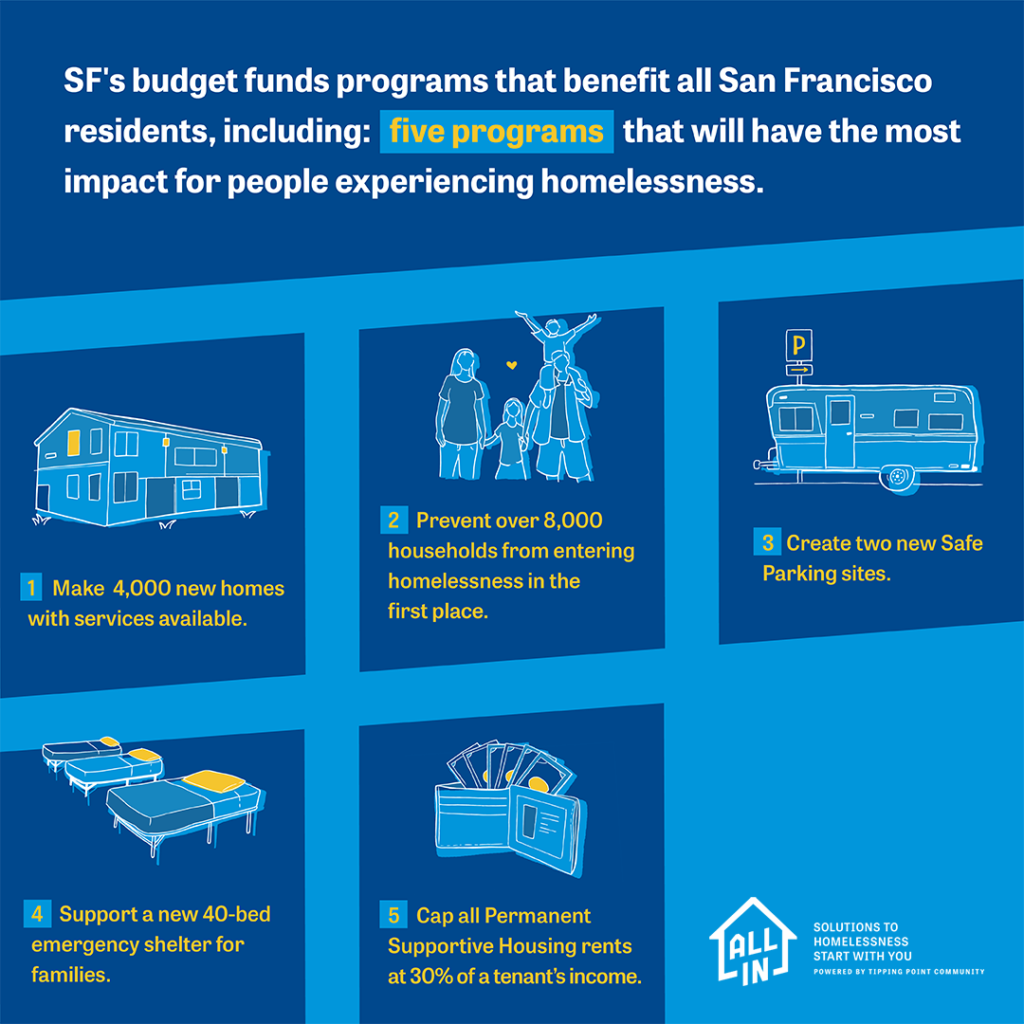A Reflection of Our Values: Funding The City’s Solutions to Homelessness

Zak Franet is a Director at Ground Floor Public Affairs, a San Francisco based government relations and community outreach firm, who has supported the work of the All In Campaign since its launch. He also has lived experience with homelessness, having spent his early adulthood on the streets of Oakland, CA. Zak also serves on the Community Advisory Council for All Home CA, an organization dedicated to ending homelessness and promoting affordable housing throughout the Bay Area.
On Thursday, July 29th, 2021, San Francisco Mayor London N. Breed signed a $13.1 Billion budget for Fiscal Years (FY) 2021-2022 & 2022-2023. The City’s annual budget is the most important piece of legislation that the Mayor and Board of Supervisors will pass in any given year, and this year’s is no exception, particularly for our unhoused neighbors.
A true testament to one’s values can be identified by how one spends their resources, which is as true with our local budget as it is with my own wallet.
Those of you who have been following the All In Campaign have heard extensively about Prop C and its impact on our ability to dramatically reduce homelessness. Over the next two years, Prop C will bring $750 Million+ in new revenue dedicated to addressing homelessness on our streets. Add in an additional $250M in other local funding sources, and our projected spending increases to over $1 Billion. Billion. With a ‘B.’
That’s a lot of money that will bring much needed relief for thousands of people.
With the economic and social fallout of the COVID-19 pandemic still wreaking havoc on vulnerable communities throughout the country, and with many households on the precipice of homelessness if they don’t receive meaningful relief, these resources could not be more timely.
Our guiding ethos of the All In Campaign is to provide transparency and accountability to the public on the resources being spent to address homelessness, and to that effect, we wanted to share a brief overview of the City budget, and its ability to deliver tangible solutions to prevent and end homelessness.
By the NumberS

a
The City Budget has five major revenue streams to support solutions to homelessness. Here’s a breakdown of how these monies are raised, and what they are being spent on:
- Prop C ($800M): Proposition C was a ballot measure passed by the San Francisco voters in November of 2018 with 61% of the vote. After being held up by litigation, Prop C funds were finally made available to the City in fall of 2020. Prop C raises revenue by implementing a Gross Receipts Tax (GRT) on the City’s highest earning businesses. For a more in-depth Prop C Analysis, check out our [Insert Prop C Blog]
- FEMA ($32M): At the onset of the COVID-19 pandemic, communities across the nation shuttered their congregant living shelters in order to prevent the spread of COVID-19 among people experiencing homelessness. To replace this critical resource, San Francisco leased over 2,200 hotels to provide emergency housing in lieu of traditional shelters and navigation centers. Shelter-In-Place (SIP) Hotels have been incredibly helpful in the City’s efforts to mitigate the impacts of COVID-19. Due to the declared Federal Emergency, the City of San Francisco is able to receive federal reimbursements from the Federal Emergency Management Agency (FEMA) for this remarkable program.
- General Fund ($47M): The General Fund is the City of San Francisco’s largest source for discretionary spending, and it supports a number of civic functions including: public safety, health and human services, and public works. What this means, is that opposed to a “set-aside”, (ex: Prop C), which is legally required, (often by ballot measure or state/federal stipulation), use of the General Fund is determined by the Mayor. General Fund revenues are raised through a combination of local taxes including property, sales, and gross receipts.
- Health and Recovery Bond ($147M): In November of 2020, the voters of San Francisco passed a $487.5M General Obligation Bond (GAO). Municipal Bonds raise funding by issuing debt to raise Capital, which is then paid back over time with interest. The Health & Recovery raised a total of $207M to invest in facilities that provide treatment, shelter, permanent supportive and transitional housing for people experiencing mental health challenges, substance use disorder and/or homelessness.
- Federal HOME ($19M): The Department of Housing & Urban Development (HUD) is the Federal agency responsible for addressing affordable housing and homelessness. The HOME program, which HUD oversees, is a federal grant awarded to local jurisdictions to assist low-income individuals attain affordable housing.

g
What does this mean for people experiencing homelessness?
The impact of our City budget cannot be overstated, particularly in the next two fiscal years, where the resources dedicated to addressing homelessness have more than doubled. Here’s a glimpse of the programs the budget will fund that will have the most significant impact for people currently experiencing homelessness:
- Add up to 4,000 new homes and services.
- Prevent homelessness and eviction for over 8,000 households.
- Support two new Safe Parking sites.
- Fund the continuation of a new 40-bed emergency shelter for families.
- Cap all Permanent Supportive Housing (PSH) rents in the City’s PSH portfolio at 30% of a tenant’s income.
A more detailed breakdown of the Department of Homelessness and Supportive Housing’s budget can be found on their website.
On the Horizon
The State of California also just passed its budget with historical investments in affordable housing ($10.3B), and to address homelessness ($12B). For more details on the State Budget, check out Governor Gavin Newsom’s Press Release on the California Comeback Plan.
You can count on the All In Campaign to continue to provide you and your networks with the most up-to-date information on our community’s efforts to end the homelessness crisis by ensuring everyone has a place to call home.

